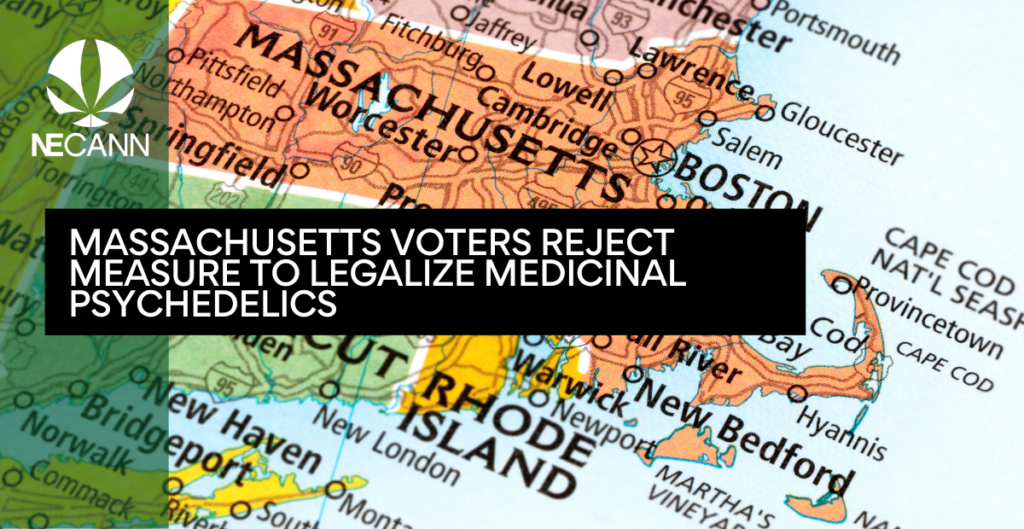Massachusetts voters rejected a groundbreaking measure that sought to legalize medicinal psychedelics, including psilocybin, DMT, and mescaline, for therapeutic use. The measure, which was defeated by a 57% to 43% margin, would have paved the way for the legal use of psychedelics in treating mental health conditions like depression, anxiety, PTSD, and substance use disorders. While proponents of the initiative argued that it could provide new treatment options for patients, including those with cancer, the measure faced significant opposition from those concerned about its broader implications.
Supporters of the measure, spearheaded by the campaign Massachusetts for Mental Health Options, believed the reform could usher in a new era of mental health care. Advocates pointed to mounting scientific research suggesting the potential of psychedelics, such as psilocybin and DMT, in treating conditions that often prove resistant to conventional therapies. They argued that psychedelics could offer profound benefits to patients suffering from depression, anxiety, and PTSD, especially among cancer patients and veterans.
The proposal, which had garnered more than $7.5 million in fundraising, also had a financial incentive. Supporters claimed that legalizing medicinal psychedelics would not only open up new treatment pathways but would also generate significant tax revenue from the burgeoning industry. The measure included provisions for licensed facilitators who would oversee the use of psychedelics during therapy sessions, setting up a regulatory framework akin to the one that has governed the medical cannabis industry in Massachusetts since its legalization.
In its proposed form, the measure would have allowed patients over the age of 21 to access psilocybin, psilocin, ibogaine, DMT, and mescaline for therapeutic purposes, though access would have been restricted to individuals who could afford the cost of a therapy session. This aspect of the proposal proved controversial, with critics arguing that the costs could limit access to those who needed the treatments the most.
Opponents of the measure, led by the Coalition for Safe Communities, raised concerns about the wide-reaching consequences of the proposal. The group, which raised only $107,000 compared to the supporters’ $7.5 million, argued that the measure was too permissive and could lead to unintended social and public health consequences. One of the major points of contention was the provision allowing patients to grow psychedelic fungi and plants at home. Critics feared this could lead to the uncontrolled spread of the substances, making them more accessible to individuals outside of medical settings and potentially fostering misuse.
Opponents also expressed concerns about the safety of psychedelic therapies. While some studies suggest the therapeutic potential of psychedelics, they argued that the lack of long-term research and the ongoing classification of these substances as Schedule I drugs under federal law raised serious doubts about their safety and effectiveness. They contended that the measure did not adequately address public safety and that there were better, more researched alternatives to treating mental health issues.
While Massachusetts voters rejected the measure, the national conversation around medicinal psychedelics is far from over. Oregon and Colorado have both moved forward with reforms legalizing psychedelics for medical use. In 2020, Oregon became the first state to legalize psilocybin for medical use in a regulated setting, while Colorado followed suit in 2022, passing a similar measure.
Meanwhile, Washington, D.C. decriminalized psilocybin, psilocin, ayahuasca, and mescaline in 2020, allowing individuals to possess and use these substances without facing criminal penalties. Despite these state-level reforms, psychedelics remain classified as Schedule I substances under federal law, meaning they are considered to have no accepted medical use and a high potential for abuse. This federal classification complicates efforts to research and implement psychedelics as part of medical treatment regimens, as scientists and practitioners must navigate stringent regulations to conduct studies and clinical trials.
In Massachusetts, the debate over medicinal psychedelics mirrored broader discussions happening across the U.S. regarding the balance between innovation in mental health care and public safety. Advocates for psychedelics emphasize the potential for treatment breakthroughs, particularly in cases where traditional therapies have failed. However, opponents caution that the risk of abuse and the uncertain long-term effects of psychedelics should not be overlooked.
Although the Massachusetts measure was rejected, the fight for medicinal psychedelics may not be over. Advocates for mental health reform are already discussing next steps, and the measure’s rejection may spur new discussions about how to better regulate and provide access to psychedelic therapies in a more controlled manner.
With growing interest in the therapeutic potential of psychedelics, Massachusetts, and other states, may continue to grapple with how to balance the benefits and risks of these substances. As research continues to unfold, it’s likely that more states will revisit the issue, potentially in future ballot measures or through legislative efforts. For now, the results of Tuesday’s vote serve as a reminder that the path to legalizing psychedelics for medical use is a challenging and contentious one, but the conversation surrounding their potential is only just beginning.
For more updates on cannabis industry news and business insights, subscribe to our daily newsletter.



